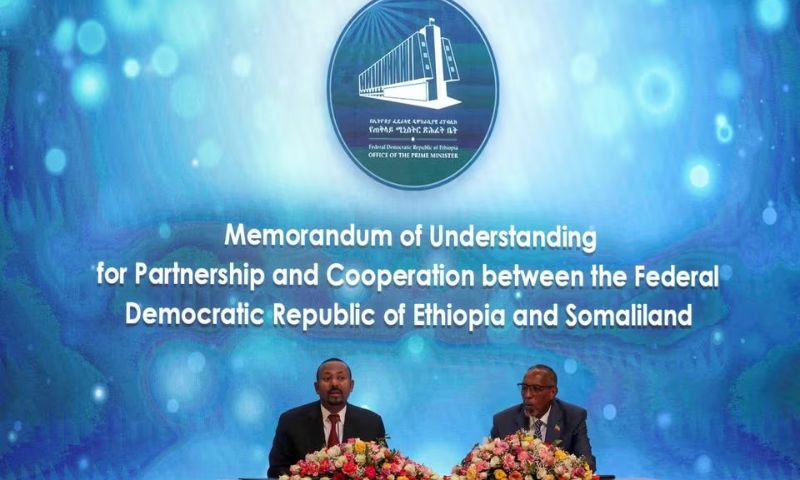- Ethiopia-Somalia port dispute has seen the European Union, the Organisation for Islamic Cooperation and the Arab League declare support for Somalia.
- The deal on the port agreement has rattled a section of Somalians who took to the streets in Mogadishu to protest against the agreement.
- The Horn of Africa, region comprises countries such as Djibouti, Eritrea, Ethiopia, and Somalia, and has long been a strategic crossroads for trade and commerce.
Hundreds of millions of dollars in lost trade deals could be on the line as the Ethiopia-Somalia port dispute intensifies tension across the volatile Horn of Africa region.
Ethiopian Prime Minister Abiy Ahmed and Somaliland’s leader Muse Bihi Abdi signed an agreement granting Ethiopia a 50-year lease on a naval base, effectively allowing access to Somaliland’s Berbera port for commercial marine operations.
As per the Memorandum of Understanding, landlocked Ethiopia was granted the right to utilize facilities in the Gulf of Aden for 50 years, both as a military facility and for commercial purposes.
The most fascinating and unconventional aspect in the agreement is that Addis Ababa will use a route that Somaliland has leased to access these facilities.
In exchange, Ethiopia made a commitment to undertake a comprehensive evaluation of Somaliland’s pursuit of official recognition as an independent nation—marking the first instance any country has offered such support to the want-away region of Somaliland.
Additionally, Somaliland is set to acquire a share in state-owned Ethiopian Airlines, although specifics about this aspect of the agreement, particularly regarding any accompanying financial arrangements, remain scanty.
The Ethiopia-Somalia port agreement has rattled Somalis who expressed their displeasure by taking to the streets of Mogadishu to protest against the innitiative.
There has been a long and tense history between Somalia and Somaliland since Mogadishu regards the four million-person self-governing area as part of its own territory.
“The Federal Government of Somalia views this as a hostile move that … constitutes a blatant transgression and intrusion into the independence, sovereignty and territorial independence of the Federal Republic of Somalia,” a government statement issued on Tuesday read.
The port dispute is now spilling to the neighboring countries putting billions worth of trade deals at jeopardy. The Horn of Africa, region comprises countries such as Djibouti, Eritrea, Ethiopia, and Somalia, and has long been a strategic crossroads for trade and commerce.
This dynamic region, situated at the intersection of Africa, the Middle East, and the Indian Ocean, holds immense economic potential driven by its strategic location and diverse resources.
How Ethiopia-Somalia port dispute could impact regional trade
Djibouti, in particular, has emerged as a key player with its state-of-the-art ports serving as vital gateways for goods entering and leaving the region. These ports facilitate the transportation of goods not only within the Horn of Africa but also to and from landlocked neighboring countries, enhancing regional connectivity.
The EU has already allocated €32 million (about $33.6 million) to a dedicated program focused on advancing regional economic integration within the Horn of Africa through the development of the Djibouti corridor.
This initiative is executed in collaboration with the Agence Française de Développement (AFD) and the aid-for-trade organization TradeMark Africa (TMA).
Ethiopia, the most populous country in the region, is a significant player in the Horn’s trade landscape. The country’s economic growth has been fueled by its focus on industrialization and export-oriented development.
The construction of new infrastructure, such as railways and roads, has improved connectivity and enabled more efficient movement of goods, contributing to the overall value of trade in the region.
Furthermore, the Horn of Africa boasts rich agricultural resources and a burgeoning manufacturing sector. Ethiopia, for instance, has become a major exporter of coffee, flowers, and textiles. This diversification of exports not only adds value to the regional trade but also provides opportunities for economic development and poverty reduction.
However, these gains risks being wiped away if the political tensions will lead to strained diplomatic relations between the countries.
According to reports, with the tense and provocative rhetoric, there are fears of a prolonged diplomatic rift between Ethiopia and Somalia. Equally, there have been no talks of an armed conflict on either side.
Read Also: What Somalia’s entrance into EAC means for East Africa
International Community Backing
Several countries and international organisations have waded into the dispute, most of them backing Somalia. The African Union, Egypt, Qatar, Turkey and the United States issued statements this week that urged Ethiopia to respect Mogadishu’s sovereignty. So have the European Union, the Organisation for Islamic Cooperation and the Arab League.
In a statement on X, the league, of which Somalia is a member, advised Ethiopia to “adhere to the rules and principles of good neighborliness”.
The Intergovernmental Authority on Development, or IGAD, an East African trading bloc, refused to take sides on Wednesday, calling instead on all parties to resolve the issue amicably. Mogadishu has criticised this response, saying it fell short of a proper condemnation.
This will likely lead to a strained trade relations and reduced cooperation on economic matters. Bilateral and multilateral trade agreements may be negatively affected, limiting the potential for mutually beneficial economic partnerships.
Despite the economic potential, challenges such as political instability, security concerns, and infrastructure gaps persist in the Horn of Africa. Experts say addressing these challenges is crucial for unlocking the full value of trade in the region and ensuring sustainable economic growth.
